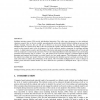Free Online Productivity Tools
i2Speak
i2Symbol
i2OCR
iTex2Img
iWeb2Print
iWeb2Shot
i2Type
iPdf2Split
iPdf2Merge
i2Bopomofo
i2Arabic
i2Style
i2Image
i2PDF
iLatex2Rtf
Sci2ools
184
Voted
IADIS
2003
2003
A Facial Expression Analysis Component for Affective Tutoring Systems
Intelligent tutoring systems (ITS) provide individualised instruction. They offer many advantages over the traditional classroom scenario: they are always available, non-judgemental and provide tailored feedback resulting in increased and effective learning. However, they are still not as effective as one-on-one human tutoring. The next generation of intelligent tutors are expected to be able to take into account the cognitive and emotional state of students. This paper reports on the progress made in the development of a facial expression analysis component for intelligent tutoring systems. A digital camera is used to grab the image of the learner and signal processing techniques such as Wavelet and ANN are employed to extract facial expressions. We have developed algorithms for detecting learner’s face and locating permanent facial features such as eyebrow, eyes, and mouth. Facial expression analysis is performed based on both permanent and transient facial features in a nearly fr...
Related Content
| Added | 31 Oct 2010 |
| Updated | 31 Oct 2010 |
| Type | Conference |
| Year | 2003 |
| Where | IADIS |
| Authors | Scott P. Overmyer, Hamid Gholam Hosseini, Chao Fan, Abdolhossein Sarrafzadeh |
Comments (0)

